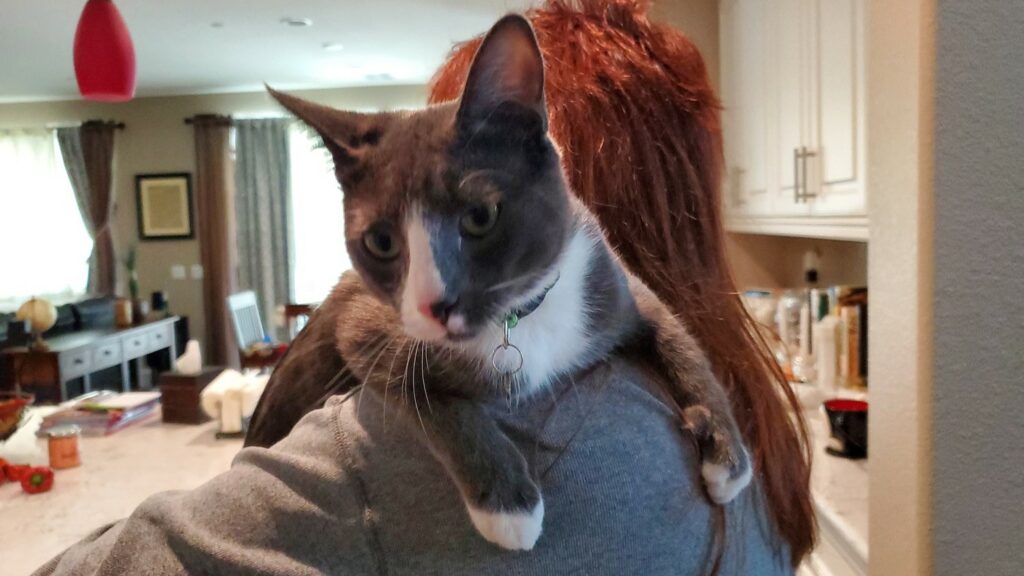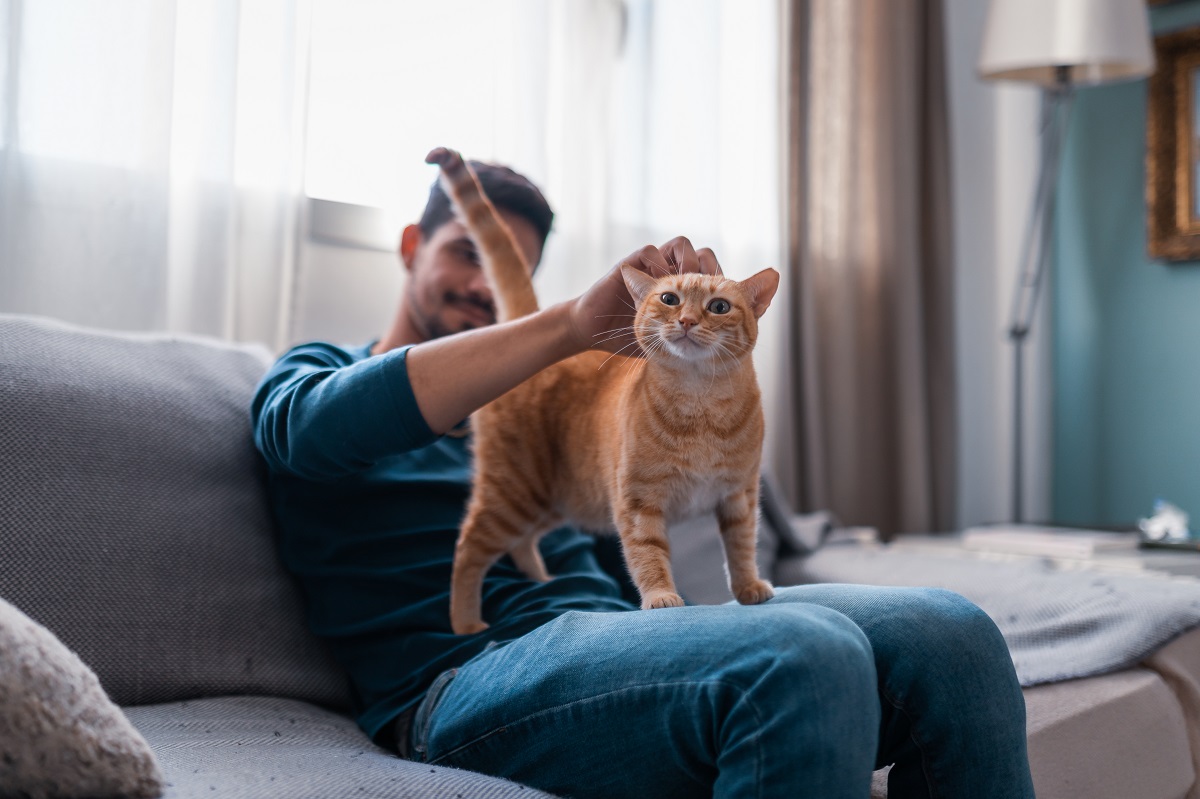Some cats cuddle politely next to you. Others treat your body like a jungle gym the minute you sit down. Whether it’s a stealthy lap invasion, a mid-Zoom shoulder leap, or a dramatic chest sprawl at 2 a.m., cats have a habit of climbing on their humans like we’re made of furniture.
If you’ve ever wondered what’s going through your cat’s fuzzy little brain when they decide to scale you like Mount Everest, the answer is both simple and surprisingly sweet. Cats climb on their people because it meets an emotional or physical need, and usually, that need involves you.
Let’s take a closer look at what motivates this clingy behavior and when it might be time to set a few boundaries.
Seeking Warmth and Comfort
One of the most common reasons cats climb on their humans is warmth. You’re essentially a heated mattress that breathes and occasionally offers snacks. Cats are built to seek out cozy spots, and nothing says cozy quite like the middle of your chest or the bend of your knees.
Your scent and heartbeat also add an extra layer of comfort. For many cats, climbing onto you is the feline equivalent of curling up in a warm blanket that smells like safety.
Craving Attention and Affection
When your cat climbs onto you, they’re often looking for a little love. This is especially true if they purr, nuzzle, or make direct eye contact while doing it. For affectionate cats, being close to you is their happy place.
Sometimes the climbing is a not-so-subtle demand: “Stop scrolling and focus on me now.” In those cases, climbing on you becomes a very effective way to interrupt whatever you’re doing and redirect your attention where it belongs (in their opinion).
Marking You as Theirs
Cats have scent glands in their paws, face, and tail, and they use those glands to mark the people and things they consider “theirs.” When your cat climbs on you, they may be laying down scent as a gentle (and invisible) claim of ownership.
This isn’t possessive in a bad way. It’s more like a signature on a friendship contract. By climbing onto you, your cat might be saying, “This human is mine, and I adore them.”
Curiosity or High Ground Advantage
Sometimes a cat climbs on you simply because you’re the highest thing around. From your lap to your shoulders, you give them a better view of their kingdom. Cats love to perch, observe, and judge the world from above.
This is especially true for more adventurous or energetic cats. If you’re sitting or lying down, you become part of the furniture layout they’re exploring, like a cat tree that occasionally sighs.
Separation Anxiety or Stress
If your cat has recently become clingier or climbs on you more than usual, it could be a sign of stress. Big changes like moving, new pets, loud guests, or even a change in routine can make cats feel insecure.
In those moments, your lap becomes a portable safe zone. Being close to you helps lower their anxiety and gives them a sense of control, especially if the rest of the house feels unpredictable.
Boredom and Play Behavior
Young cats, especially kittens, may climb on you because they’re bored. If you’ve got a little one pouncing on your shoulder while you work, they may just be trying to engage you in play.
In this case, redirecting their energy with a wand toy or scheduled play sessions can help reduce the acrobatics during your downtime. They don’t mean to be annoying. They’re just bursting with energy and you happen to be vertical.
Reinforced Behavior (You Trained Them Without Realizing)
Let’s be honest. The first time your cat climbed on you, you probably laughed, petted them, or gave them a treat. Maybe you even posted a video. From your cat’s perspective, that response was pure gold.
Cats are smart, and they remember what works. If climbing on you got them love, food, or attention in the past, they’re going to try it again. You may have unintentionally taught them that climbing equals reward.

Dear Joey, you’ll soon discover the glorious heights of the human-leg mountain. These warm, moving towers are perfect for honing your climbing skills. But remember, it’s not a successful climb unless you’ve startled the human! At the summit, don’t forget to stake your claim with a triumphant “Meow!” Just between us cats, it’s all about #ClaimingTheHighGround. #CatsRuleTheWorld
Winston
When to Set Boundaries
If your cat’s climbing habits are becoming a problem, you’re allowed to set limits. Whether they’re waking you up at night or turning work calls into chaos, you can teach them that certain behaviors are off-limits.
Try these tips:
- Keep a cozy blanket or cat bed near you as a designated cuddle spot
- Gently move them to that spot when they climb on you
- Reward them with attention once they settle where you want them
- Stay consistent with boundaries, even if they try to “cute” their way back into your lap
Consistency and redirection go a long way without hurting their feelings or breaking the bond.
Final Thoughts: You’re the Favorite Human, and They Want You to Know It
Whether it’s for comfort, warmth, attention, or just the thrill of the climb, cats often climb on their people because they feel secure and connected. It’s one of the many quirky, lovable behaviors that come with living alongside a miniature predator who also thinks you’re their mom.
Of course, you don’t have to be a 24-hour jungle gym if it’s not working for you. But the next time your cat scales your chest and flops across your face like a dramatic house scarf, take it as the highest compliment. You’re their person, and they want to be exactly where you are.
Sources:
Why Do Cats Sit on You? https://www.purina.com/articles/cat/behavior/why-do-cats-sit-on-you
Why Is My Cat So Clingy? https://www.hillspet.com/cat-care/behavior-appearance/clingy-cat-behavior
Understanding Cat Behavior https://www.aspca.org/pet-care/cat-care/common-cat-behavior-issues
Cat Clinginess and Anxiety https://www.vet.cornell.edu/departments-centers-and-institutes/cornell-feline-health-center/health-information/feline-health-topics/separation-anxiety-cats
Recent Posts
Your Cat Might Be a Furry Little Healer… or at Least a Fuzzy Alarm System If you’ve ever had your cat suddenly become extra clingy when you’re under the weather, you’re not alone. From...
Cats are experts at hiding things, socks under furniture, their disdain for your playlist, and, unfortunately, symptoms of illness. In the wild, showing weakness could make them a target, so even...


